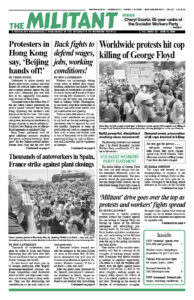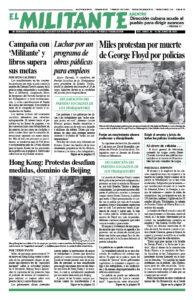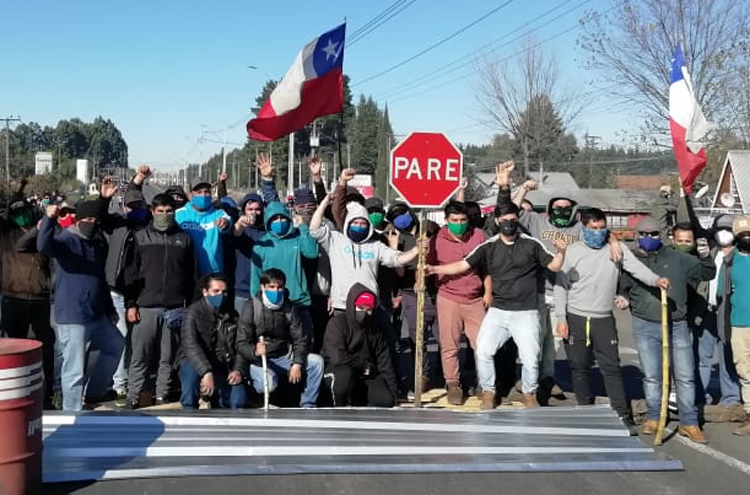“The company, the supervisors, the government authorities, the police, the virus and the rain are all against us,” said Claudio Higueras Osorio, union president and one of nearly 500 workers on strike at Promasa, a lumber company in Los Ángeles, Chile. Nonetheless, for 43 days workers struck for higher wages, better conditions and a contract.
“We were tired of all the inequality and the arrogance of the supervisors,” Higueras told the Militant in a June 1 phone interview.
The supervisors always push for faster production, imposing overtime and pushing workers harder. “They exploit us to the maximum,” Higueras said. “There are a lot of on-the-job injuries. A lot of amputations, especially of fingers.”
The government kept up constant pressure to try to force strikers back to work, claiming no one should strike during the coronavirus pandemic. Health officials came to the picket line demanding strikers wear face masks and “social distance.”
“The police have arrested more than 20 strikers claiming they were causing ‘disorder in the street,’ but then released them,” Higueras said. “They do it to intimidate us.”
The latest attack was on June 1 when the police dispersed strikers with water cannon. Union leaders reached an agreement with the company to end the strike later that day, even though it “wasn’t what we wanted,” Higueras told La Tribuna.
About half of the 1,200 workers at the plant — whose biggest customer is Lowe’s in the United States — are in the CUT trade union federation affiliated union.
This is one of a growing number of working-class battles today in Chile and across Latin America, many of which face government crackdowns on the pretext of limiting the spread of coronavirus.
Workers at Holdtech, a call center for WOM cellphone company, won their key demands May 25 after nearly three weeks on strike.
These include a wage increase, time and a half on holidays and company subsidized transportation to work. “We also won back pay for the days on strike,” Angélica Carrera, a call center worker and president of the Holdtech union, said by phone from Coquimbo.
Like the workers at Promasa, the Holdtech workers organized an “olla común,” or communal pot, a long tradition in working-class struggles in Chile. A stew is prepared in a huge pot and dished out to everyone.
“We received a lot of support, but we also went out knocking on doors” to spread the word about the strike, Carrera said. “That’s why we won.”
Many call center workers are urged to work from home because of the quarantine imposed by the government. “The company provided computers, but refuses to pay for the internet or even a good chair,” Carrera said. “We work 10-hour days.”
“There have always been abuses and it’s always the workers that pay the price, especially those who were already living day by day before the pandemic,” Carrera said.
A wave of massive anti-government protests in Chile began in October when students in the capital, Santiago, protested rising subway prices. The actions rapidly spread to include workers and farmers, demanding a rise in the minimum wage, better pensions and health care and a constituent assembly to replace the constitution imposed by the Augusto Pinochet dictatorship. A pause in the protests started after the government of President Sebastián Piñero imposed a ban on gatherings of more than 50 people in April.
“I think those demonstrations are going to explode again soon,” Carrera said.
In mid-May young people and others blocked streets in five working-class neighborhoods in Santiago, demanding jobs and food. Cops and soldiers dispersed the protesters with high-pressure water and tear gas.
More than 900 people have been detained across the country for violating a government curfew.
The Piñero government claims it has distributed 2.5 million food baskets and other necessities. “I am a single mother. I want to work, but what can I do if there are no jobs,” a laid-off janitor protesting in El Bosque told TV24 news. “The government has not given me a single bag of food. What am I supposed to live on?”
At least 25% of Chilean workers have lost their jobs over the last few months.


